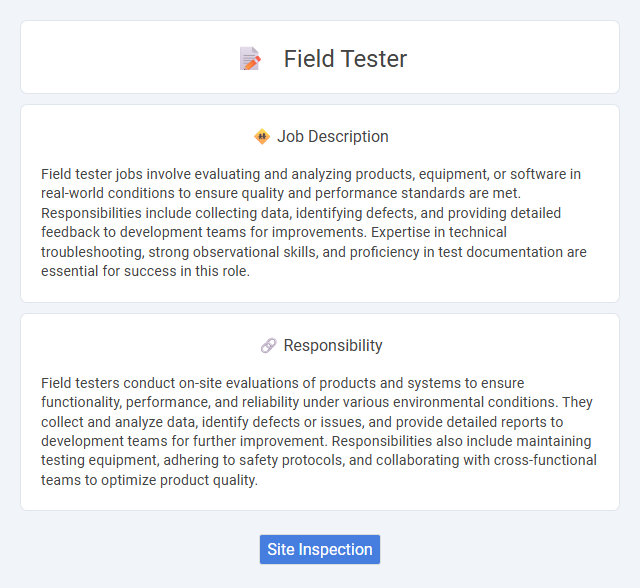
Field tester jobs involve evaluating and analyzing products, equipment, or software in real-world conditions to ensure quality and performance standards are met. Responsibilities include collecting data, identifying defects, and providing detailed feedback to development teams for improvements. Expertise in technical troubleshooting, strong observational skills, and proficiency in test documentation are essential for success in this role.
Individuals who are physically active and comfortable working outdoors in various weather conditions are likely suitable for a Field Tester job. Those with strong observational skills and attention to detail might find this role aligns well with their capabilities. Candidates who prefer consistent routines or indoor work could face challenges adapting to the dynamic and sometimes unpredictable nature of field testing tasks.
Qualification
A Field Tester typically requires a combination of technical skills and hands-on experience, including proficiency in operating testing equipment, understanding of quality control procedures, and knowledge of industry-specific standards. A background in engineering, electronics, or related fields often supports effective problem-solving and data analysis during on-site testing. Certifications such as ISTQB for software testers or specialized safety training enhance the candidate's qualifications and reliability in field testing roles.
Responsibility
Field testers conduct on-site evaluations of products and systems to ensure functionality, performance, and reliability under various environmental conditions. They collect and analyze data, identify defects or issues, and provide detailed reports to development teams for further improvement. Responsibilities also include maintaining testing equipment, adhering to safety protocols, and collaborating with cross-functional teams to optimize product quality.
Benefit
Field tester jobs likely offer valuable hands-on experience in real-world environments, enhancing practical skills and technical knowledge. There is a high probability of gaining direct exposure to product performance, which can improve problem-solving abilities. These roles may also provide opportunities for travel and flexible working conditions, resulting in increased job satisfaction.
Challenge
A field tester job likely presents challenges related to troubleshooting equipment or technology in unpredictable environments, requiring adaptability and problem-solving skills. The role may involve working under pressure to accurately assess functionality and report issues promptly. Candidates probably need to manage physical demands and navigate logistical obstacles while maintaining precision in testing protocols.
Career Advancement
Field tester jobs offer hands-on experience with product performance and quality assessment, providing valuable industry insights. Gaining expertise in troubleshooting and data analysis enhances technical skills, paving the way for roles such as quality assurance manager or product development specialist. Consistent performance and proficiency in reporting tools can accelerate promotion opportunities within engineering or manufacturing sectors.
Key Terms
Site Inspection
Field testers specializing in site inspection perform critical assessments of infrastructure conditions to ensure compliance with safety and quality standards. They utilize advanced diagnostic tools and techniques to evaluate structural integrity, identify defects, and recommend necessary maintenance or repairs. Their precise data collection and reporting facilitate informed decision-making in construction, telecommunications, and energy sectors.
 kuljobs.com
kuljobs.com